Psychology for Health and Social Care: Theories, Factors, and Roles
VerifiedAdded on 2020/10/05
|13
|4275
|155
Report
AI Summary
This report delves into the multifaceted field of psychology, particularly its application within health and social care settings. It begins by comparing various psychological theories of lifespan development, such as behavioral and cognitive theories, and their relevance to specific life stages, including infancy, early childhood, and adulthood, with a detailed examination of Erikson's psychosocial stages. The report then explores the impact of social and biological factors on human behavior, emphasizing the influence of culture, religion, education, genetic characteristics, and hormonal changes. Furthermore, it highlights the significance of social roles in the context of health and social care, stressing the importance of improving equality for patients with psychological disorders and promoting preventative measures. The report also discusses the application of psychological theories to individuals experiencing stress, behavioral disturbances, and mental health disorders, and the use of psychological principles to affect behavioral change, ultimately enhancing the understanding of relationships. The report concludes with a self-evaluation and references.
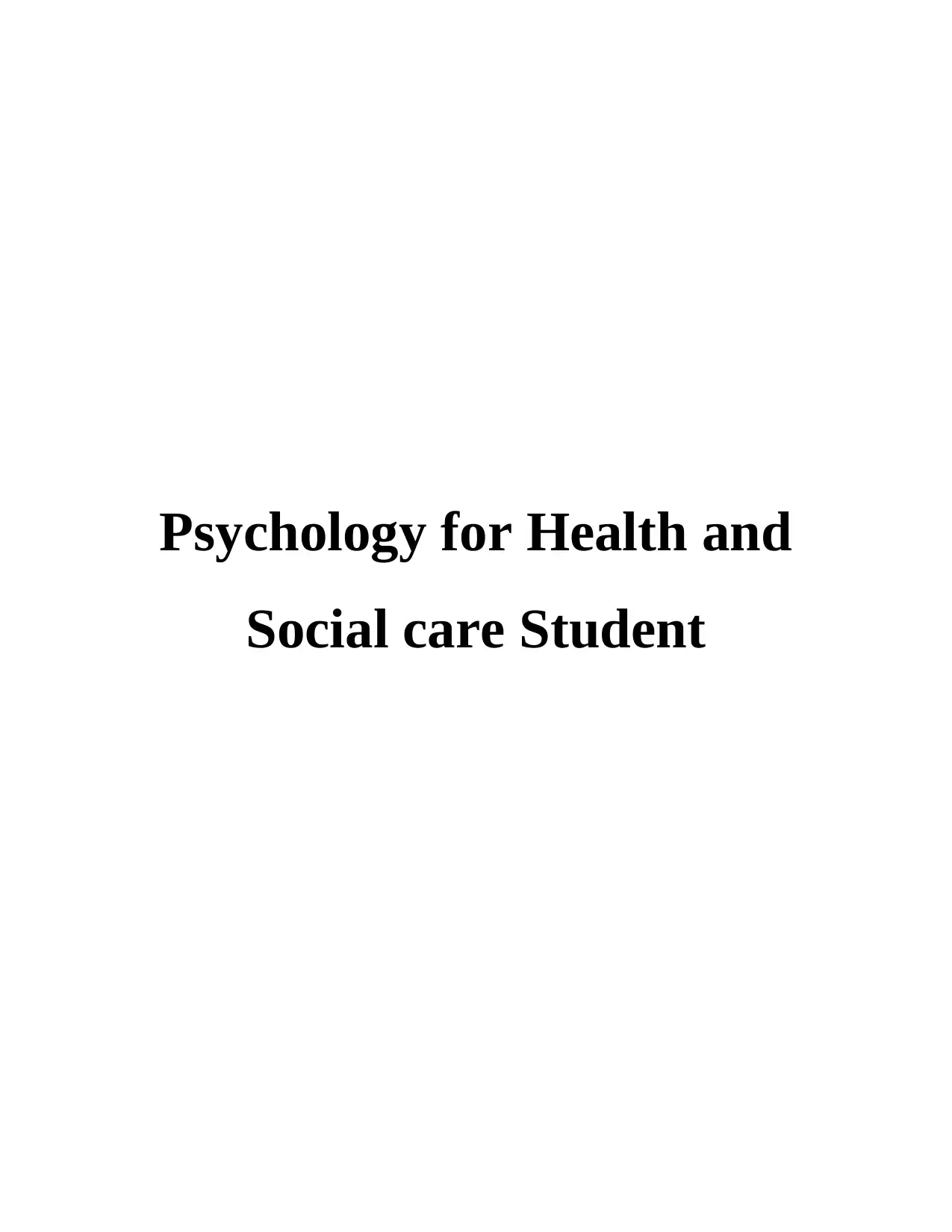
Psychology for Health and
Social care Student
Social care Student
Paraphrase This Document
Need a fresh take? Get an instant paraphrase of this document with our AI Paraphraser
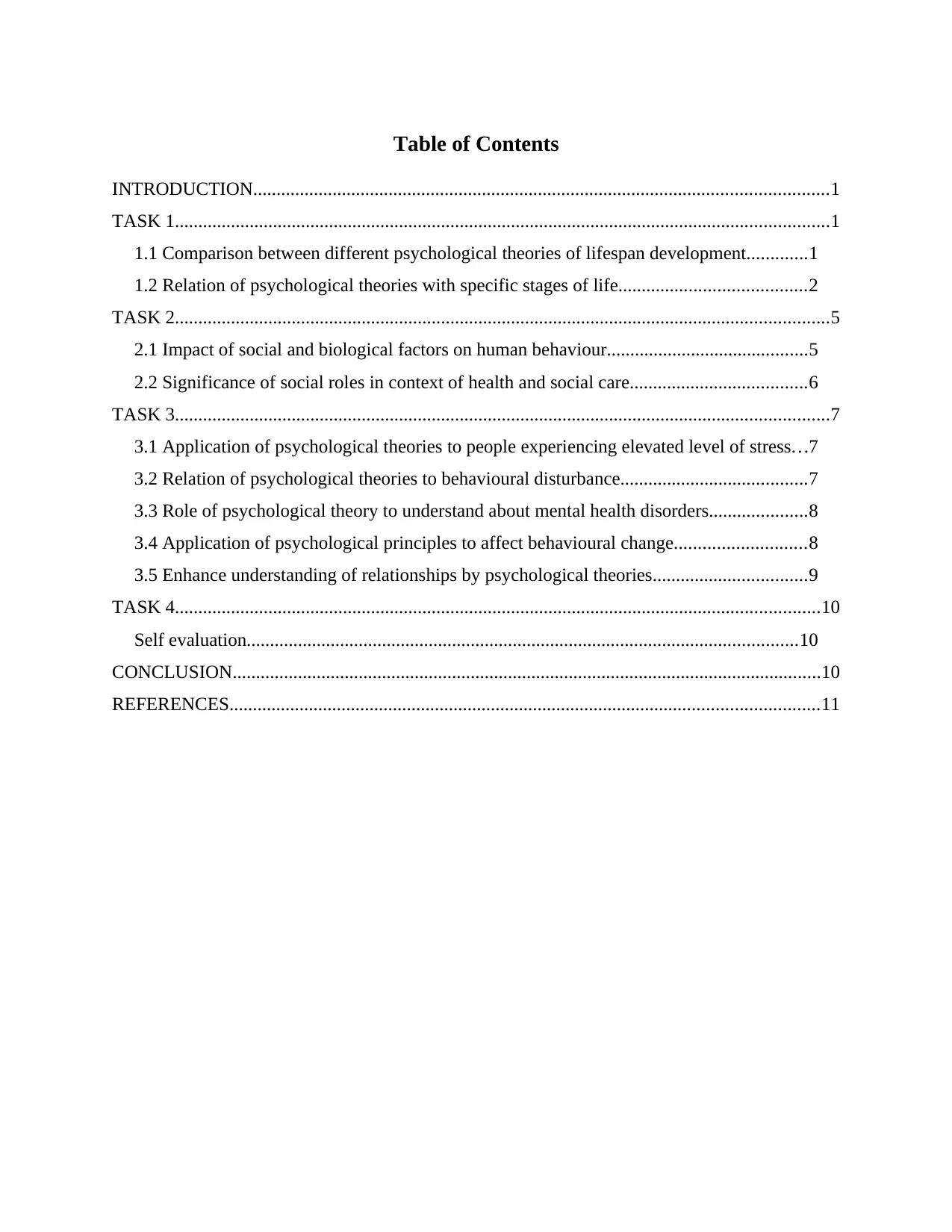
Table of Contents
INTRODUCTION...........................................................................................................................1
TASK 1............................................................................................................................................1
1.1 Comparison between different psychological theories of lifespan development.............1
1.2 Relation of psychological theories with specific stages of life........................................2
TASK 2............................................................................................................................................5
2.1 Impact of social and biological factors on human behaviour...........................................5
2.2 Significance of social roles in context of health and social care......................................6
TASK 3............................................................................................................................................7
3.1 Application of psychological theories to people experiencing elevated level of stress...7
3.2 Relation of psychological theories to behavioural disturbance........................................7
3.3 Role of psychological theory to understand about mental health disorders.....................8
3.4 Application of psychological principles to affect behavioural change............................8
3.5 Enhance understanding of relationships by psychological theories.................................9
TASK 4..........................................................................................................................................10
Self evaluation......................................................................................................................10
CONCLUSION..............................................................................................................................10
REFERENCES..............................................................................................................................11
INTRODUCTION...........................................................................................................................1
TASK 1............................................................................................................................................1
1.1 Comparison between different psychological theories of lifespan development.............1
1.2 Relation of psychological theories with specific stages of life........................................2
TASK 2............................................................................................................................................5
2.1 Impact of social and biological factors on human behaviour...........................................5
2.2 Significance of social roles in context of health and social care......................................6
TASK 3............................................................................................................................................7
3.1 Application of psychological theories to people experiencing elevated level of stress...7
3.2 Relation of psychological theories to behavioural disturbance........................................7
3.3 Role of psychological theory to understand about mental health disorders.....................8
3.4 Application of psychological principles to affect behavioural change............................8
3.5 Enhance understanding of relationships by psychological theories.................................9
TASK 4..........................................................................................................................................10
Self evaluation......................................................................................................................10
CONCLUSION..............................................................................................................................10
REFERENCES..............................................................................................................................11
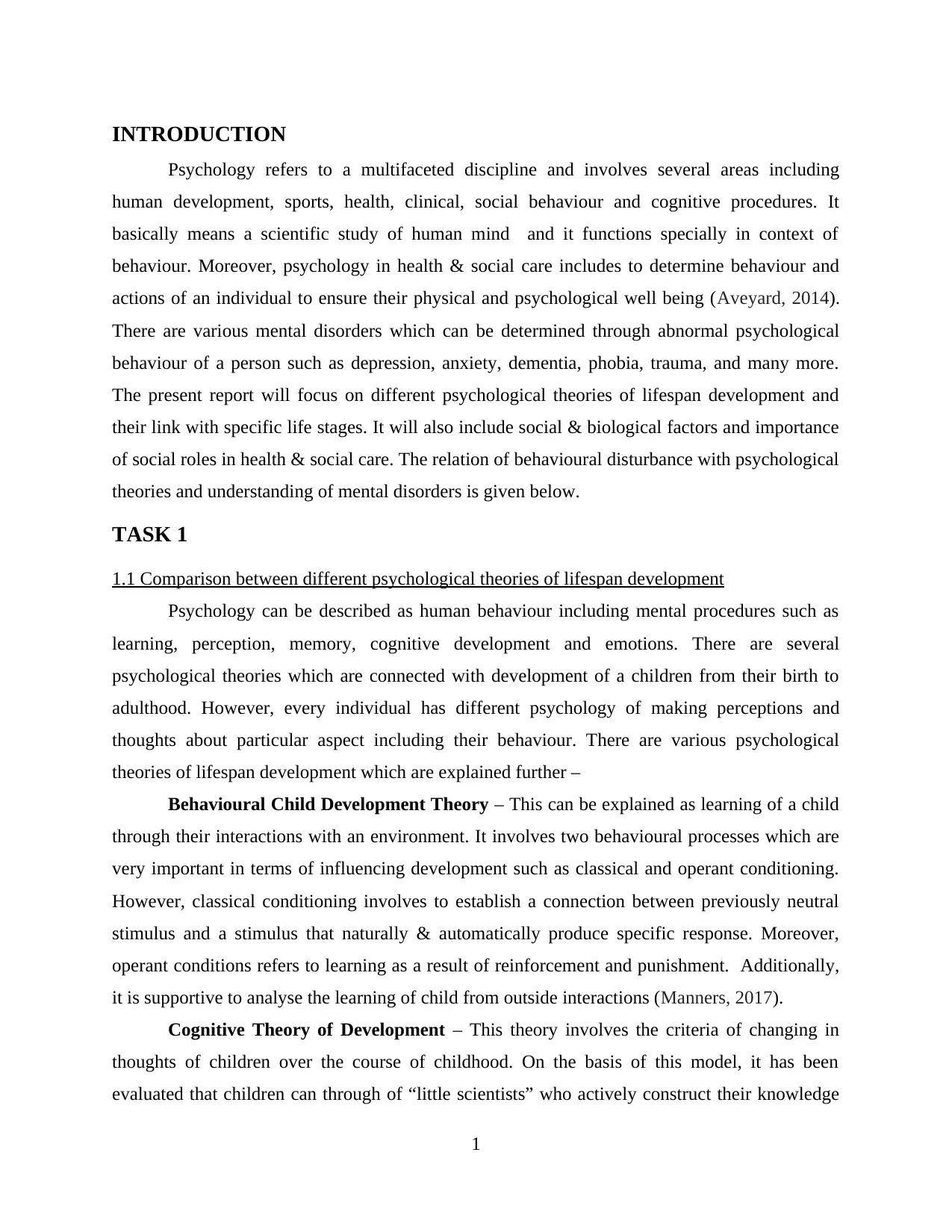
INTRODUCTION
Psychology refers to a multifaceted discipline and involves several areas including
human development, sports, health, clinical, social behaviour and cognitive procedures. It
basically means a scientific study of human mind and it functions specially in context of
behaviour. Moreover, psychology in health & social care includes to determine behaviour and
actions of an individual to ensure their physical and psychological well being (Aveyard, 2014).
There are various mental disorders which can be determined through abnormal psychological
behaviour of a person such as depression, anxiety, dementia, phobia, trauma, and many more.
The present report will focus on different psychological theories of lifespan development and
their link with specific life stages. It will also include social & biological factors and importance
of social roles in health & social care. The relation of behavioural disturbance with psychological
theories and understanding of mental disorders is given below.
TASK 1
1.1 Comparison between different psychological theories of lifespan development
Psychology can be described as human behaviour including mental procedures such as
learning, perception, memory, cognitive development and emotions. There are several
psychological theories which are connected with development of a children from their birth to
adulthood. However, every individual has different psychology of making perceptions and
thoughts about particular aspect including their behaviour. There are various psychological
theories of lifespan development which are explained further –
Behavioural Child Development Theory – This can be explained as learning of a child
through their interactions with an environment. It involves two behavioural processes which are
very important in terms of influencing development such as classical and operant conditioning.
However, classical conditioning involves to establish a connection between previously neutral
stimulus and a stimulus that naturally & automatically produce specific response. Moreover,
operant conditions refers to learning as a result of reinforcement and punishment. Additionally,
it is supportive to analyse the learning of child from outside interactions (Manners, 2017).
Cognitive Theory of Development – This theory involves the criteria of changing in
thoughts of children over the course of childhood. On the basis of this model, it has been
evaluated that children can through of “little scientists” who actively construct their knowledge
1
Psychology refers to a multifaceted discipline and involves several areas including
human development, sports, health, clinical, social behaviour and cognitive procedures. It
basically means a scientific study of human mind and it functions specially in context of
behaviour. Moreover, psychology in health & social care includes to determine behaviour and
actions of an individual to ensure their physical and psychological well being (Aveyard, 2014).
There are various mental disorders which can be determined through abnormal psychological
behaviour of a person such as depression, anxiety, dementia, phobia, trauma, and many more.
The present report will focus on different psychological theories of lifespan development and
their link with specific life stages. It will also include social & biological factors and importance
of social roles in health & social care. The relation of behavioural disturbance with psychological
theories and understanding of mental disorders is given below.
TASK 1
1.1 Comparison between different psychological theories of lifespan development
Psychology can be described as human behaviour including mental procedures such as
learning, perception, memory, cognitive development and emotions. There are several
psychological theories which are connected with development of a children from their birth to
adulthood. However, every individual has different psychology of making perceptions and
thoughts about particular aspect including their behaviour. There are various psychological
theories of lifespan development which are explained further –
Behavioural Child Development Theory – This can be explained as learning of a child
through their interactions with an environment. It involves two behavioural processes which are
very important in terms of influencing development such as classical and operant conditioning.
However, classical conditioning involves to establish a connection between previously neutral
stimulus and a stimulus that naturally & automatically produce specific response. Moreover,
operant conditions refers to learning as a result of reinforcement and punishment. Additionally,
it is supportive to analyse the learning of child from outside interactions (Manners, 2017).
Cognitive Theory of Development – This theory involves the criteria of changing in
thoughts of children over the course of childhood. On the basis of this model, it has been
evaluated that children can through of “little scientists” who actively construct their knowledge
1
⊘ This is a preview!⊘
Do you want full access?
Subscribe today to unlock all pages.

Trusted by 1+ million students worldwide
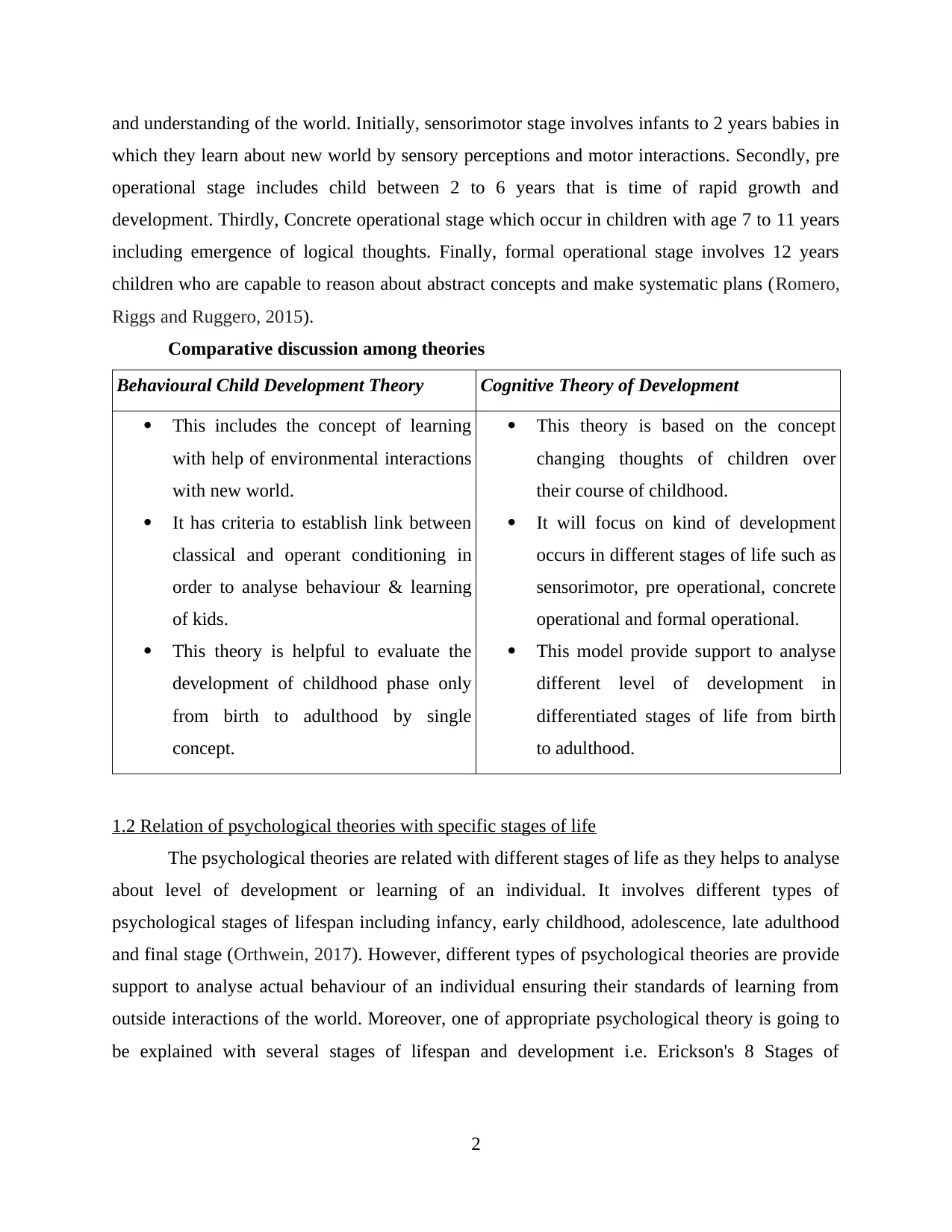
and understanding of the world. Initially, sensorimotor stage involves infants to 2 years babies in
which they learn about new world by sensory perceptions and motor interactions. Secondly, pre
operational stage includes child between 2 to 6 years that is time of rapid growth and
development. Thirdly, Concrete operational stage which occur in children with age 7 to 11 years
including emergence of logical thoughts. Finally, formal operational stage involves 12 years
children who are capable to reason about abstract concepts and make systematic plans (Romero,
Riggs and Ruggero, 2015).
Comparative discussion among theories
Behavioural Child Development Theory Cognitive Theory of Development
This includes the concept of learning
with help of environmental interactions
with new world.
It has criteria to establish link between
classical and operant conditioning in
order to analyse behaviour & learning
of kids.
This theory is helpful to evaluate the
development of childhood phase only
from birth to adulthood by single
concept.
This theory is based on the concept
changing thoughts of children over
their course of childhood.
It will focus on kind of development
occurs in different stages of life such as
sensorimotor, pre operational, concrete
operational and formal operational.
This model provide support to analyse
different level of development in
differentiated stages of life from birth
to adulthood.
1.2 Relation of psychological theories with specific stages of life
The psychological theories are related with different stages of life as they helps to analyse
about level of development or learning of an individual. It involves different types of
psychological stages of lifespan including infancy, early childhood, adolescence, late adulthood
and final stage (Orthwein, 2017). However, different types of psychological theories are provide
support to analyse actual behaviour of an individual ensuring their standards of learning from
outside interactions of the world. Moreover, one of appropriate psychological theory is going to
be explained with several stages of lifespan and development i.e. Erickson's 8 Stages of
2
which they learn about new world by sensory perceptions and motor interactions. Secondly, pre
operational stage includes child between 2 to 6 years that is time of rapid growth and
development. Thirdly, Concrete operational stage which occur in children with age 7 to 11 years
including emergence of logical thoughts. Finally, formal operational stage involves 12 years
children who are capable to reason about abstract concepts and make systematic plans (Romero,
Riggs and Ruggero, 2015).
Comparative discussion among theories
Behavioural Child Development Theory Cognitive Theory of Development
This includes the concept of learning
with help of environmental interactions
with new world.
It has criteria to establish link between
classical and operant conditioning in
order to analyse behaviour & learning
of kids.
This theory is helpful to evaluate the
development of childhood phase only
from birth to adulthood by single
concept.
This theory is based on the concept
changing thoughts of children over
their course of childhood.
It will focus on kind of development
occurs in different stages of life such as
sensorimotor, pre operational, concrete
operational and formal operational.
This model provide support to analyse
different level of development in
differentiated stages of life from birth
to adulthood.
1.2 Relation of psychological theories with specific stages of life
The psychological theories are related with different stages of life as they helps to analyse
about level of development or learning of an individual. It involves different types of
psychological stages of lifespan including infancy, early childhood, adolescence, late adulthood
and final stage (Orthwein, 2017). However, different types of psychological theories are provide
support to analyse actual behaviour of an individual ensuring their standards of learning from
outside interactions of the world. Moreover, one of appropriate psychological theory is going to
be explained with several stages of lifespan and development i.e. Erickson's 8 Stages of
2
Paraphrase This Document
Need a fresh take? Get an instant paraphrase of this document with our AI Paraphraser
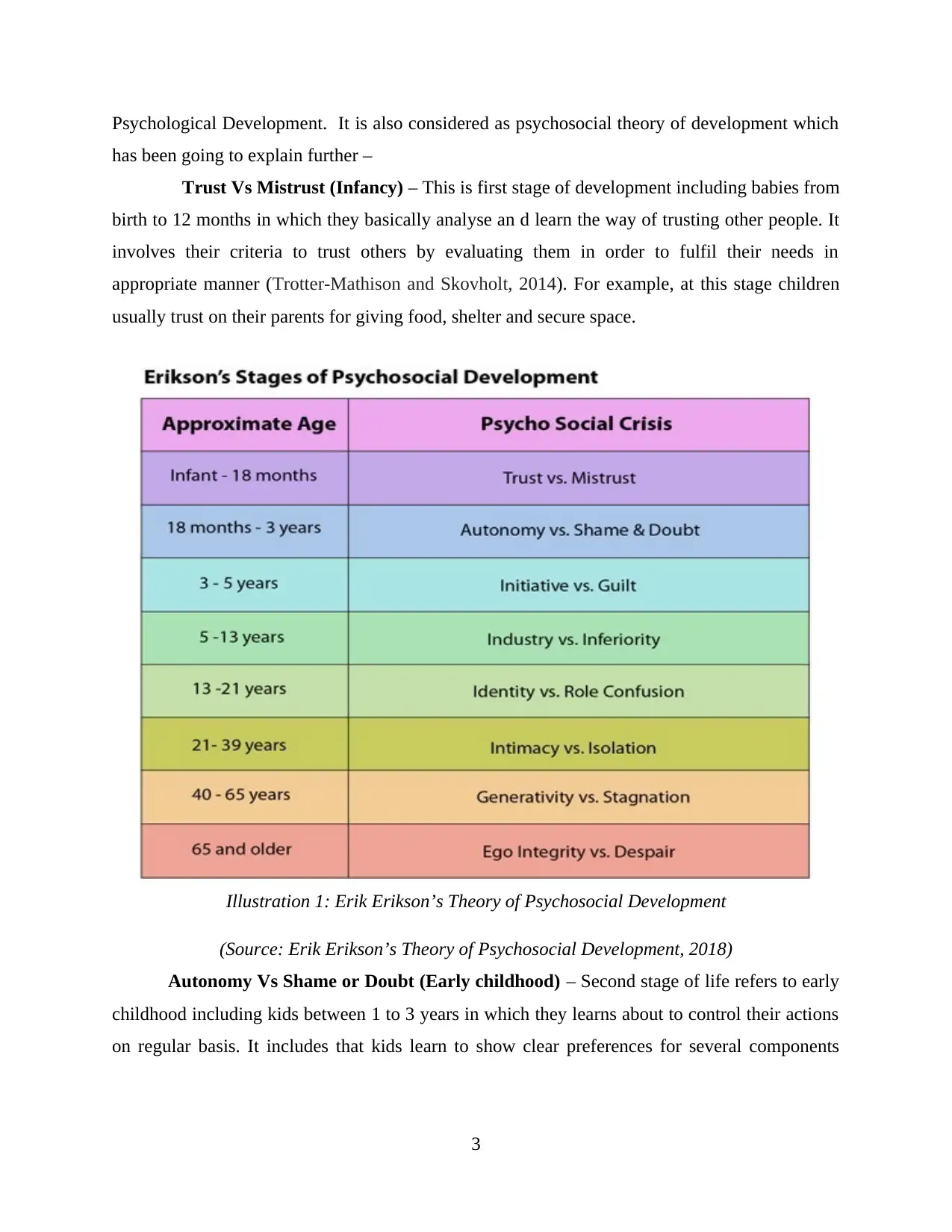
Psychological Development. It is also considered as psychosocial theory of development which
has been going to explain further –
Trust Vs Mistrust (Infancy) – This is first stage of development including babies from
birth to 12 months in which they basically analyse an d learn the way of trusting other people. It
involves their criteria to trust others by evaluating them in order to fulfil their needs in
appropriate manner (Trotter-Mathison and Skovholt, 2014). For example, at this stage children
usually trust on their parents for giving food, shelter and secure space.
(Source: Erik Erikson’s Theory of Psychosocial Development, 2018)
Autonomy Vs Shame or Doubt (Early childhood) – Second stage of life refers to early
childhood including kids between 1 to 3 years in which they learns about to control their actions
on regular basis. It includes that kids learn to show clear preferences for several components
3
Illustration 1: Erik Erikson’s Theory of Psychosocial Development
has been going to explain further –
Trust Vs Mistrust (Infancy) – This is first stage of development including babies from
birth to 12 months in which they basically analyse an d learn the way of trusting other people. It
involves their criteria to trust others by evaluating them in order to fulfil their needs in
appropriate manner (Trotter-Mathison and Skovholt, 2014). For example, at this stage children
usually trust on their parents for giving food, shelter and secure space.
(Source: Erik Erikson’s Theory of Psychosocial Development, 2018)
Autonomy Vs Shame or Doubt (Early childhood) – Second stage of life refers to early
childhood including kids between 1 to 3 years in which they learns about to control their actions
on regular basis. It includes that kids learn to show clear preferences for several components
3
Illustration 1: Erik Erikson’s Theory of Psychosocial Development
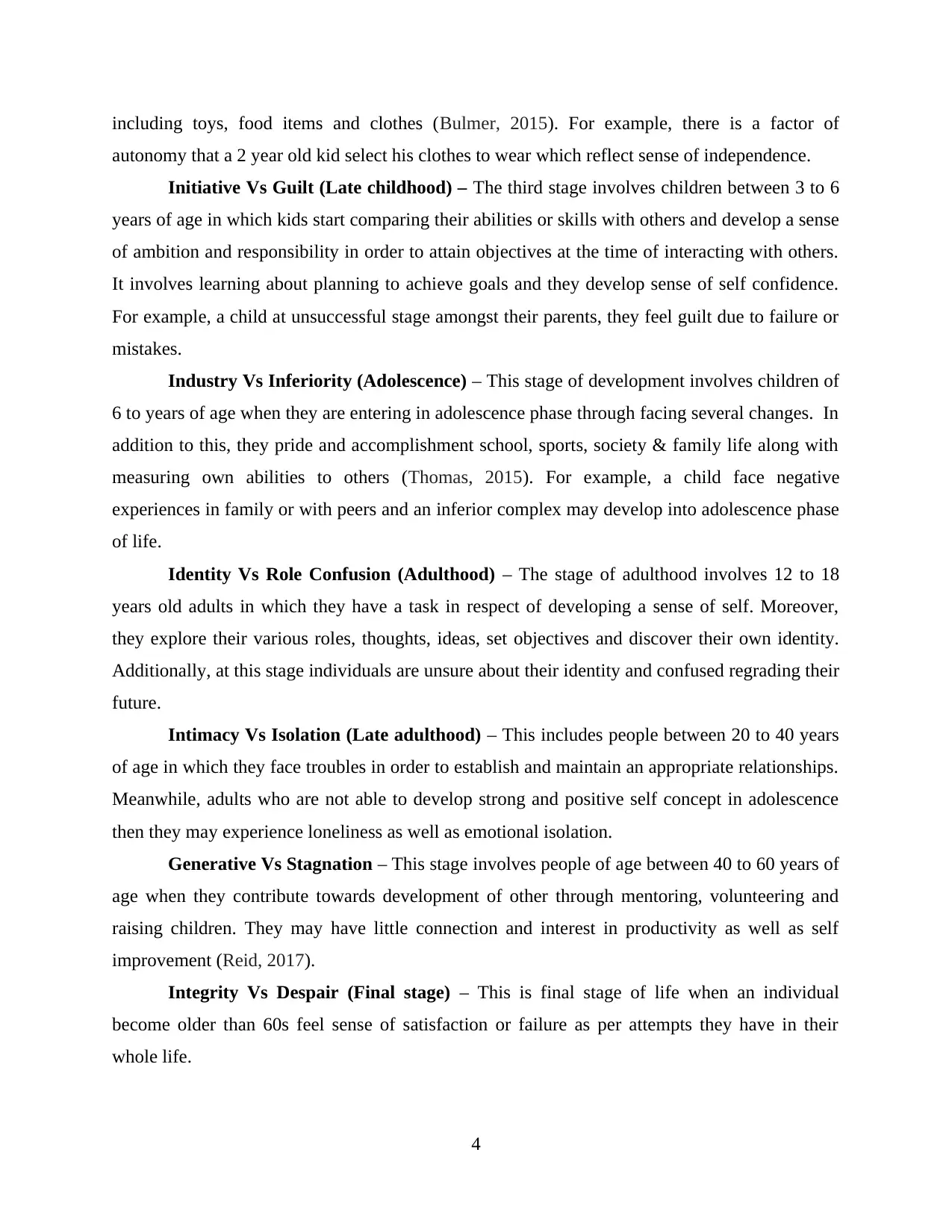
including toys, food items and clothes (Bulmer, 2015). For example, there is a factor of
autonomy that a 2 year old kid select his clothes to wear which reflect sense of independence.
Initiative Vs Guilt (Late childhood) – The third stage involves children between 3 to 6
years of age in which kids start comparing their abilities or skills with others and develop a sense
of ambition and responsibility in order to attain objectives at the time of interacting with others.
It involves learning about planning to achieve goals and they develop sense of self confidence.
For example, a child at unsuccessful stage amongst their parents, they feel guilt due to failure or
mistakes.
Industry Vs Inferiority (Adolescence) – This stage of development involves children of
6 to years of age when they are entering in adolescence phase through facing several changes. In
addition to this, they pride and accomplishment school, sports, society & family life along with
measuring own abilities to others (Thomas, 2015). For example, a child face negative
experiences in family or with peers and an inferior complex may develop into adolescence phase
of life.
Identity Vs Role Confusion (Adulthood) – The stage of adulthood involves 12 to 18
years old adults in which they have a task in respect of developing a sense of self. Moreover,
they explore their various roles, thoughts, ideas, set objectives and discover their own identity.
Additionally, at this stage individuals are unsure about their identity and confused regrading their
future.
Intimacy Vs Isolation (Late adulthood) – This includes people between 20 to 40 years
of age in which they face troubles in order to establish and maintain an appropriate relationships.
Meanwhile, adults who are not able to develop strong and positive self concept in adolescence
then they may experience loneliness as well as emotional isolation.
Generative Vs Stagnation – This stage involves people of age between 40 to 60 years of
age when they contribute towards development of other through mentoring, volunteering and
raising children. They may have little connection and interest in productivity as well as self
improvement (Reid, 2017).
Integrity Vs Despair (Final stage) – This is final stage of life when an individual
become older than 60s feel sense of satisfaction or failure as per attempts they have in their
whole life.
4
autonomy that a 2 year old kid select his clothes to wear which reflect sense of independence.
Initiative Vs Guilt (Late childhood) – The third stage involves children between 3 to 6
years of age in which kids start comparing their abilities or skills with others and develop a sense
of ambition and responsibility in order to attain objectives at the time of interacting with others.
It involves learning about planning to achieve goals and they develop sense of self confidence.
For example, a child at unsuccessful stage amongst their parents, they feel guilt due to failure or
mistakes.
Industry Vs Inferiority (Adolescence) – This stage of development involves children of
6 to years of age when they are entering in adolescence phase through facing several changes. In
addition to this, they pride and accomplishment school, sports, society & family life along with
measuring own abilities to others (Thomas, 2015). For example, a child face negative
experiences in family or with peers and an inferior complex may develop into adolescence phase
of life.
Identity Vs Role Confusion (Adulthood) – The stage of adulthood involves 12 to 18
years old adults in which they have a task in respect of developing a sense of self. Moreover,
they explore their various roles, thoughts, ideas, set objectives and discover their own identity.
Additionally, at this stage individuals are unsure about their identity and confused regrading their
future.
Intimacy Vs Isolation (Late adulthood) – This includes people between 20 to 40 years
of age in which they face troubles in order to establish and maintain an appropriate relationships.
Meanwhile, adults who are not able to develop strong and positive self concept in adolescence
then they may experience loneliness as well as emotional isolation.
Generative Vs Stagnation – This stage involves people of age between 40 to 60 years of
age when they contribute towards development of other through mentoring, volunteering and
raising children. They may have little connection and interest in productivity as well as self
improvement (Reid, 2017).
Integrity Vs Despair (Final stage) – This is final stage of life when an individual
become older than 60s feel sense of satisfaction or failure as per attempts they have in their
whole life.
4
⊘ This is a preview!⊘
Do you want full access?
Subscribe today to unlock all pages.

Trusted by 1+ million students worldwide
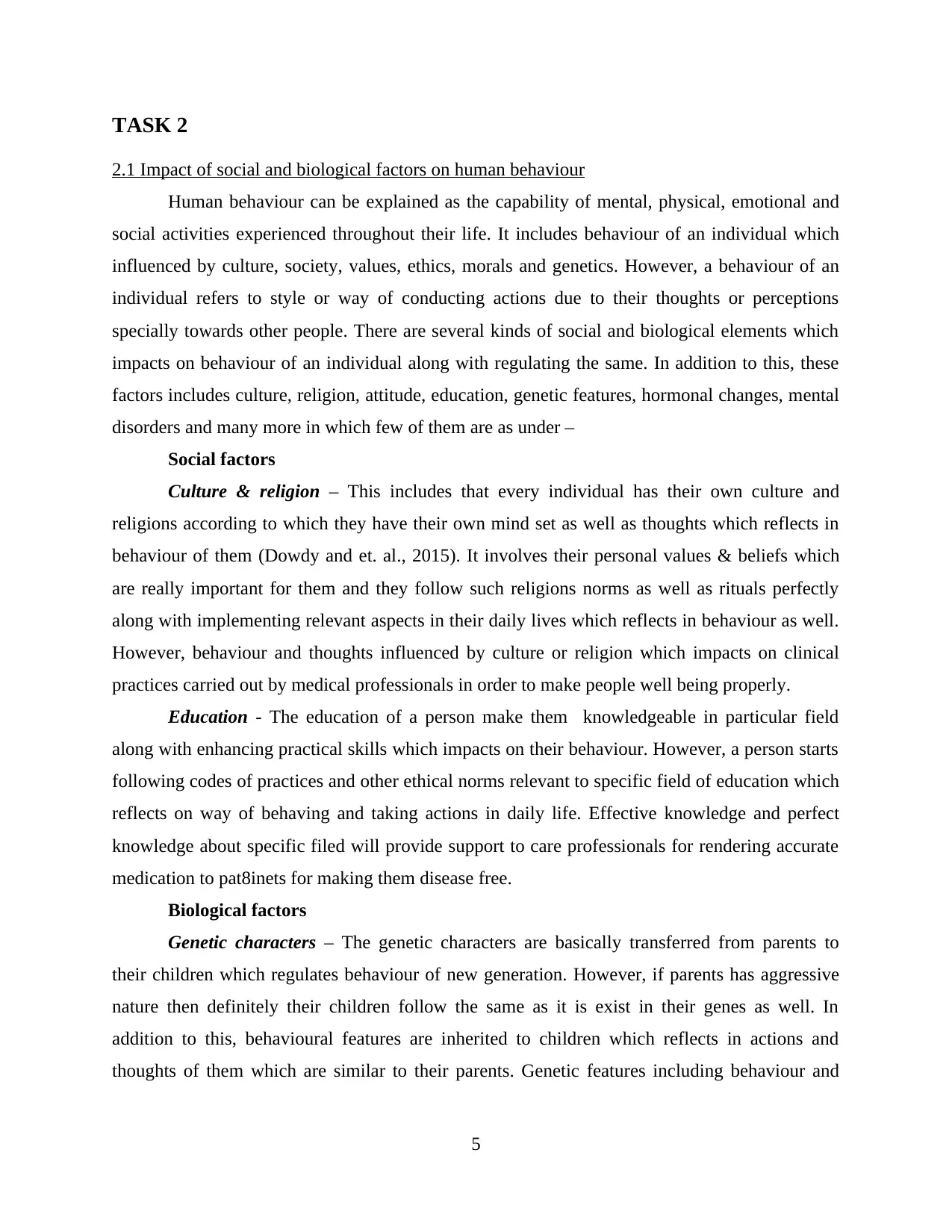
TASK 2
2.1 Impact of social and biological factors on human behaviour
Human behaviour can be explained as the capability of mental, physical, emotional and
social activities experienced throughout their life. It includes behaviour of an individual which
influenced by culture, society, values, ethics, morals and genetics. However, a behaviour of an
individual refers to style or way of conducting actions due to their thoughts or perceptions
specially towards other people. There are several kinds of social and biological elements which
impacts on behaviour of an individual along with regulating the same. In addition to this, these
factors includes culture, religion, attitude, education, genetic features, hormonal changes, mental
disorders and many more in which few of them are as under –
Social factors
Culture & religion – This includes that every individual has their own culture and
religions according to which they have their own mind set as well as thoughts which reflects in
behaviour of them (Dowdy and et. al., 2015). It involves their personal values & beliefs which
are really important for them and they follow such religions norms as well as rituals perfectly
along with implementing relevant aspects in their daily lives which reflects in behaviour as well.
However, behaviour and thoughts influenced by culture or religion which impacts on clinical
practices carried out by medical professionals in order to make people well being properly.
Education - The education of a person make them knowledgeable in particular field
along with enhancing practical skills which impacts on their behaviour. However, a person starts
following codes of practices and other ethical norms relevant to specific field of education which
reflects on way of behaving and taking actions in daily life. Effective knowledge and perfect
knowledge about specific filed will provide support to care professionals for rendering accurate
medication to pat8inets for making them disease free.
Biological factors
Genetic characters – The genetic characters are basically transferred from parents to
their children which regulates behaviour of new generation. However, if parents has aggressive
nature then definitely their children follow the same as it is exist in their genes as well. In
addition to this, behavioural features are inherited to children which reflects in actions and
thoughts of them which are similar to their parents. Genetic features including behaviour and
5
2.1 Impact of social and biological factors on human behaviour
Human behaviour can be explained as the capability of mental, physical, emotional and
social activities experienced throughout their life. It includes behaviour of an individual which
influenced by culture, society, values, ethics, morals and genetics. However, a behaviour of an
individual refers to style or way of conducting actions due to their thoughts or perceptions
specially towards other people. There are several kinds of social and biological elements which
impacts on behaviour of an individual along with regulating the same. In addition to this, these
factors includes culture, religion, attitude, education, genetic features, hormonal changes, mental
disorders and many more in which few of them are as under –
Social factors
Culture & religion – This includes that every individual has their own culture and
religions according to which they have their own mind set as well as thoughts which reflects in
behaviour of them (Dowdy and et. al., 2015). It involves their personal values & beliefs which
are really important for them and they follow such religions norms as well as rituals perfectly
along with implementing relevant aspects in their daily lives which reflects in behaviour as well.
However, behaviour and thoughts influenced by culture or religion which impacts on clinical
practices carried out by medical professionals in order to make people well being properly.
Education - The education of a person make them knowledgeable in particular field
along with enhancing practical skills which impacts on their behaviour. However, a person starts
following codes of practices and other ethical norms relevant to specific field of education which
reflects on way of behaving and taking actions in daily life. Effective knowledge and perfect
knowledge about specific filed will provide support to care professionals for rendering accurate
medication to pat8inets for making them disease free.
Biological factors
Genetic characters – The genetic characters are basically transferred from parents to
their children which regulates behaviour of new generation. However, if parents has aggressive
nature then definitely their children follow the same as it is exist in their genes as well. In
addition to this, behavioural features are inherited to children which reflects in actions and
thoughts of them which are similar to their parents. Genetic features including behaviour and
5
Paraphrase This Document
Need a fresh take? Get an instant paraphrase of this document with our AI Paraphraser
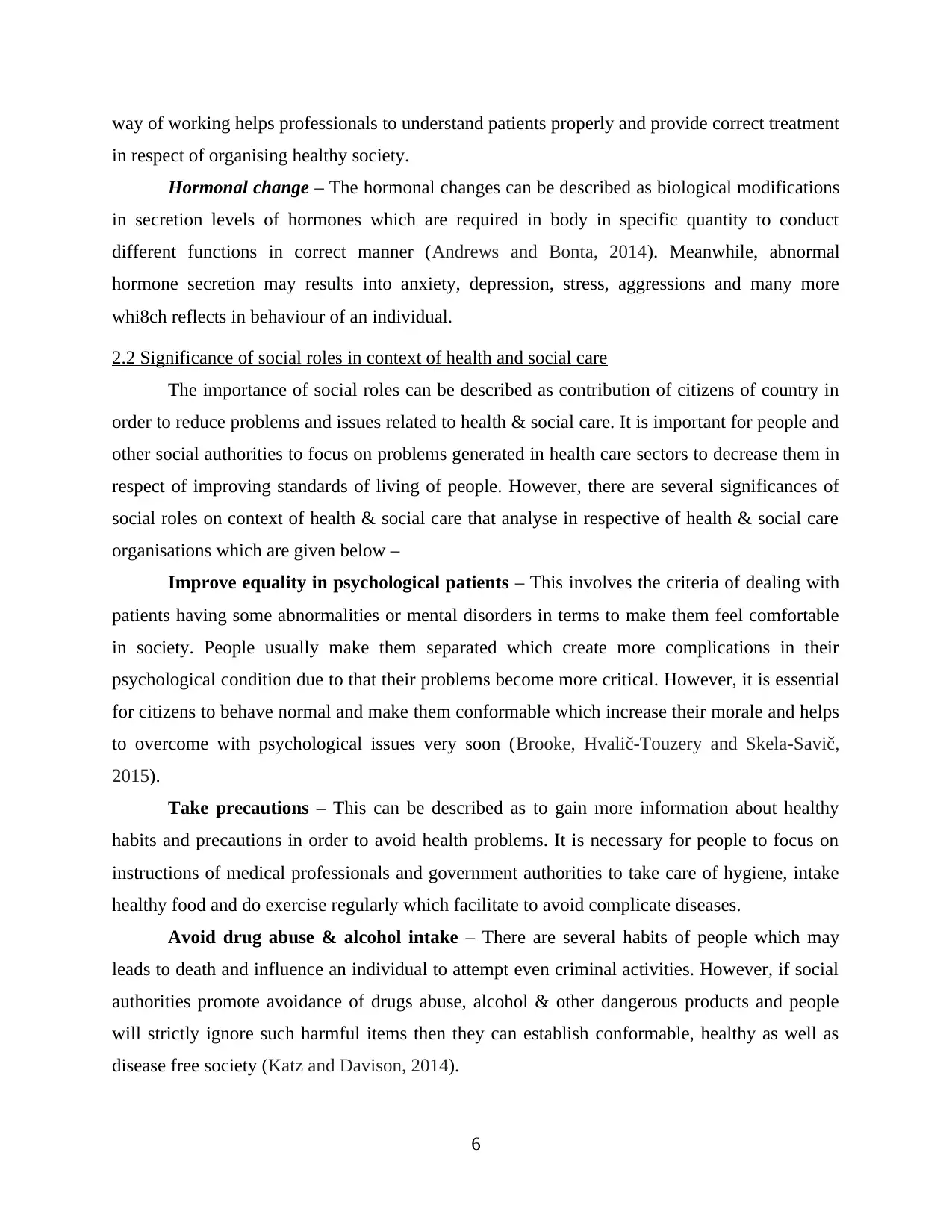
way of working helps professionals to understand patients properly and provide correct treatment
in respect of organising healthy society.
Hormonal change – The hormonal changes can be described as biological modifications
in secretion levels of hormones which are required in body in specific quantity to conduct
different functions in correct manner (Andrews and Bonta, 2014). Meanwhile, abnormal
hormone secretion may results into anxiety, depression, stress, aggressions and many more
whi8ch reflects in behaviour of an individual.
2.2 Significance of social roles in context of health and social care
The importance of social roles can be described as contribution of citizens of country in
order to reduce problems and issues related to health & social care. It is important for people and
other social authorities to focus on problems generated in health care sectors to decrease them in
respect of improving standards of living of people. However, there are several significances of
social roles on context of health & social care that analyse in respective of health & social care
organisations which are given below –
Improve equality in psychological patients – This involves the criteria of dealing with
patients having some abnormalities or mental disorders in terms to make them feel comfortable
in society. People usually make them separated which create more complications in their
psychological condition due to that their problems become more critical. However, it is essential
for citizens to behave normal and make them conformable which increase their morale and helps
to overcome with psychological issues very soon (Brooke, Hvalič-Touzery and Skela-Savič,
2015).
Take precautions – This can be described as to gain more information about healthy
habits and precautions in order to avoid health problems. It is necessary for people to focus on
instructions of medical professionals and government authorities to take care of hygiene, intake
healthy food and do exercise regularly which facilitate to avoid complicate diseases.
Avoid drug abuse & alcohol intake – There are several habits of people which may
leads to death and influence an individual to attempt even criminal activities. However, if social
authorities promote avoidance of drugs abuse, alcohol & other dangerous products and people
will strictly ignore such harmful items then they can establish conformable, healthy as well as
disease free society (Katz and Davison, 2014).
6
in respect of organising healthy society.
Hormonal change – The hormonal changes can be described as biological modifications
in secretion levels of hormones which are required in body in specific quantity to conduct
different functions in correct manner (Andrews and Bonta, 2014). Meanwhile, abnormal
hormone secretion may results into anxiety, depression, stress, aggressions and many more
whi8ch reflects in behaviour of an individual.
2.2 Significance of social roles in context of health and social care
The importance of social roles can be described as contribution of citizens of country in
order to reduce problems and issues related to health & social care. It is important for people and
other social authorities to focus on problems generated in health care sectors to decrease them in
respect of improving standards of living of people. However, there are several significances of
social roles on context of health & social care that analyse in respective of health & social care
organisations which are given below –
Improve equality in psychological patients – This involves the criteria of dealing with
patients having some abnormalities or mental disorders in terms to make them feel comfortable
in society. People usually make them separated which create more complications in their
psychological condition due to that their problems become more critical. However, it is essential
for citizens to behave normal and make them conformable which increase their morale and helps
to overcome with psychological issues very soon (Brooke, Hvalič-Touzery and Skela-Savič,
2015).
Take precautions – This can be described as to gain more information about healthy
habits and precautions in order to avoid health problems. It is necessary for people to focus on
instructions of medical professionals and government authorities to take care of hygiene, intake
healthy food and do exercise regularly which facilitate to avoid complicate diseases.
Avoid drug abuse & alcohol intake – There are several habits of people which may
leads to death and influence an individual to attempt even criminal activities. However, if social
authorities promote avoidance of drugs abuse, alcohol & other dangerous products and people
will strictly ignore such harmful items then they can establish conformable, healthy as well as
disease free society (Katz and Davison, 2014).
6
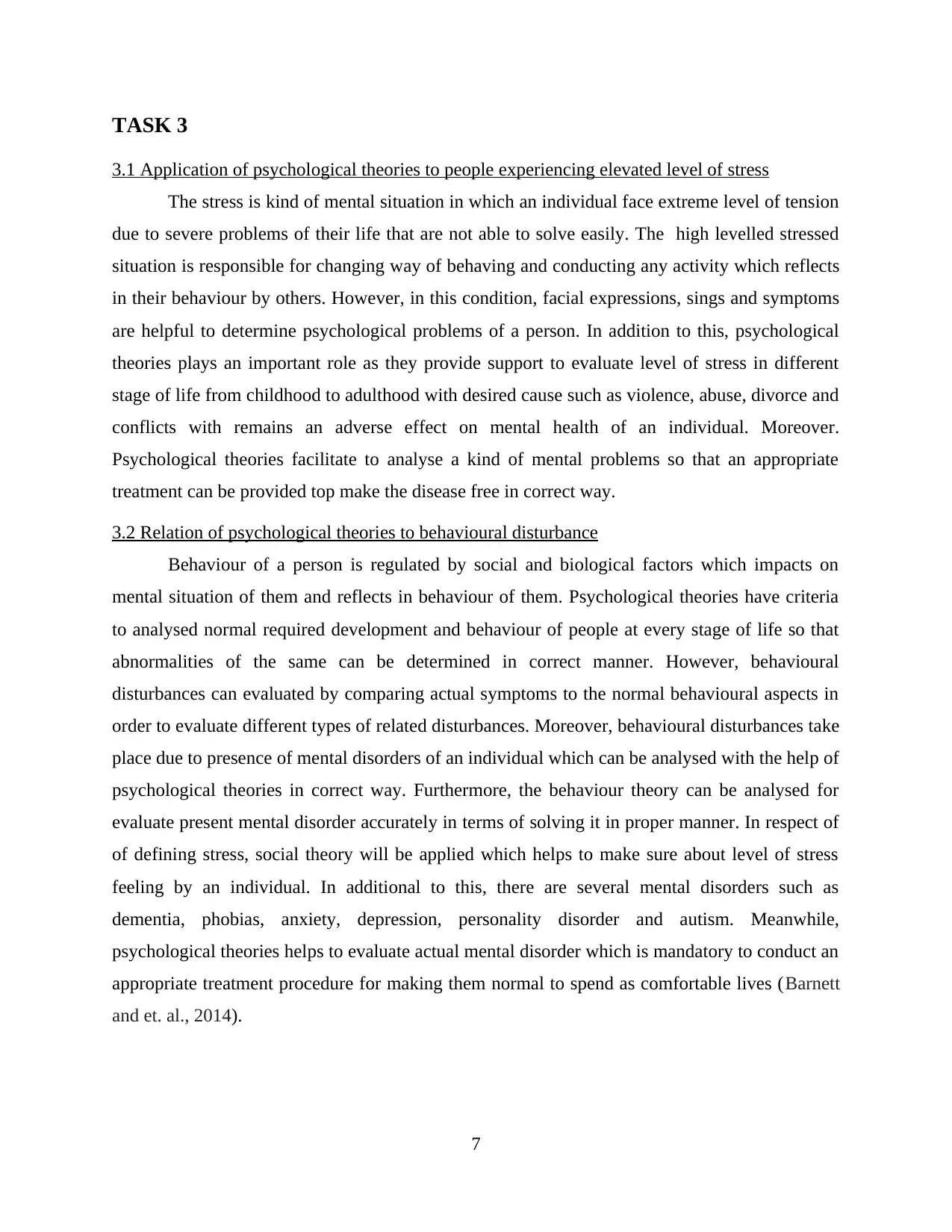
TASK 3
3.1 Application of psychological theories to people experiencing elevated level of stress
The stress is kind of mental situation in which an individual face extreme level of tension
due to severe problems of their life that are not able to solve easily. The high levelled stressed
situation is responsible for changing way of behaving and conducting any activity which reflects
in their behaviour by others. However, in this condition, facial expressions, sings and symptoms
are helpful to determine psychological problems of a person. In addition to this, psychological
theories plays an important role as they provide support to evaluate level of stress in different
stage of life from childhood to adulthood with desired cause such as violence, abuse, divorce and
conflicts with remains an adverse effect on mental health of an individual. Moreover.
Psychological theories facilitate to analyse a kind of mental problems so that an appropriate
treatment can be provided top make the disease free in correct way.
3.2 Relation of psychological theories to behavioural disturbance
Behaviour of a person is regulated by social and biological factors which impacts on
mental situation of them and reflects in behaviour of them. Psychological theories have criteria
to analysed normal required development and behaviour of people at every stage of life so that
abnormalities of the same can be determined in correct manner. However, behavioural
disturbances can evaluated by comparing actual symptoms to the normal behavioural aspects in
order to evaluate different types of related disturbances. Moreover, behavioural disturbances take
place due to presence of mental disorders of an individual which can be analysed with the help of
psychological theories in correct way. Furthermore, the behaviour theory can be analysed for
evaluate present mental disorder accurately in terms of solving it in proper manner. In respect of
of defining stress, social theory will be applied which helps to make sure about level of stress
feeling by an individual. In additional to this, there are several mental disorders such as
dementia, phobias, anxiety, depression, personality disorder and autism. Meanwhile,
psychological theories helps to evaluate actual mental disorder which is mandatory to conduct an
appropriate treatment procedure for making them normal to spend as comfortable lives (Barnett
and et. al., 2014).
7
3.1 Application of psychological theories to people experiencing elevated level of stress
The stress is kind of mental situation in which an individual face extreme level of tension
due to severe problems of their life that are not able to solve easily. The high levelled stressed
situation is responsible for changing way of behaving and conducting any activity which reflects
in their behaviour by others. However, in this condition, facial expressions, sings and symptoms
are helpful to determine psychological problems of a person. In addition to this, psychological
theories plays an important role as they provide support to evaluate level of stress in different
stage of life from childhood to adulthood with desired cause such as violence, abuse, divorce and
conflicts with remains an adverse effect on mental health of an individual. Moreover.
Psychological theories facilitate to analyse a kind of mental problems so that an appropriate
treatment can be provided top make the disease free in correct way.
3.2 Relation of psychological theories to behavioural disturbance
Behaviour of a person is regulated by social and biological factors which impacts on
mental situation of them and reflects in behaviour of them. Psychological theories have criteria
to analysed normal required development and behaviour of people at every stage of life so that
abnormalities of the same can be determined in correct manner. However, behavioural
disturbances can evaluated by comparing actual symptoms to the normal behavioural aspects in
order to evaluate different types of related disturbances. Moreover, behavioural disturbances take
place due to presence of mental disorders of an individual which can be analysed with the help of
psychological theories in correct way. Furthermore, the behaviour theory can be analysed for
evaluate present mental disorder accurately in terms of solving it in proper manner. In respect of
of defining stress, social theory will be applied which helps to make sure about level of stress
feeling by an individual. In additional to this, there are several mental disorders such as
dementia, phobias, anxiety, depression, personality disorder and autism. Meanwhile,
psychological theories helps to evaluate actual mental disorder which is mandatory to conduct an
appropriate treatment procedure for making them normal to spend as comfortable lives (Barnett
and et. al., 2014).
7
⊘ This is a preview!⊘
Do you want full access?
Subscribe today to unlock all pages.

Trusted by 1+ million students worldwide
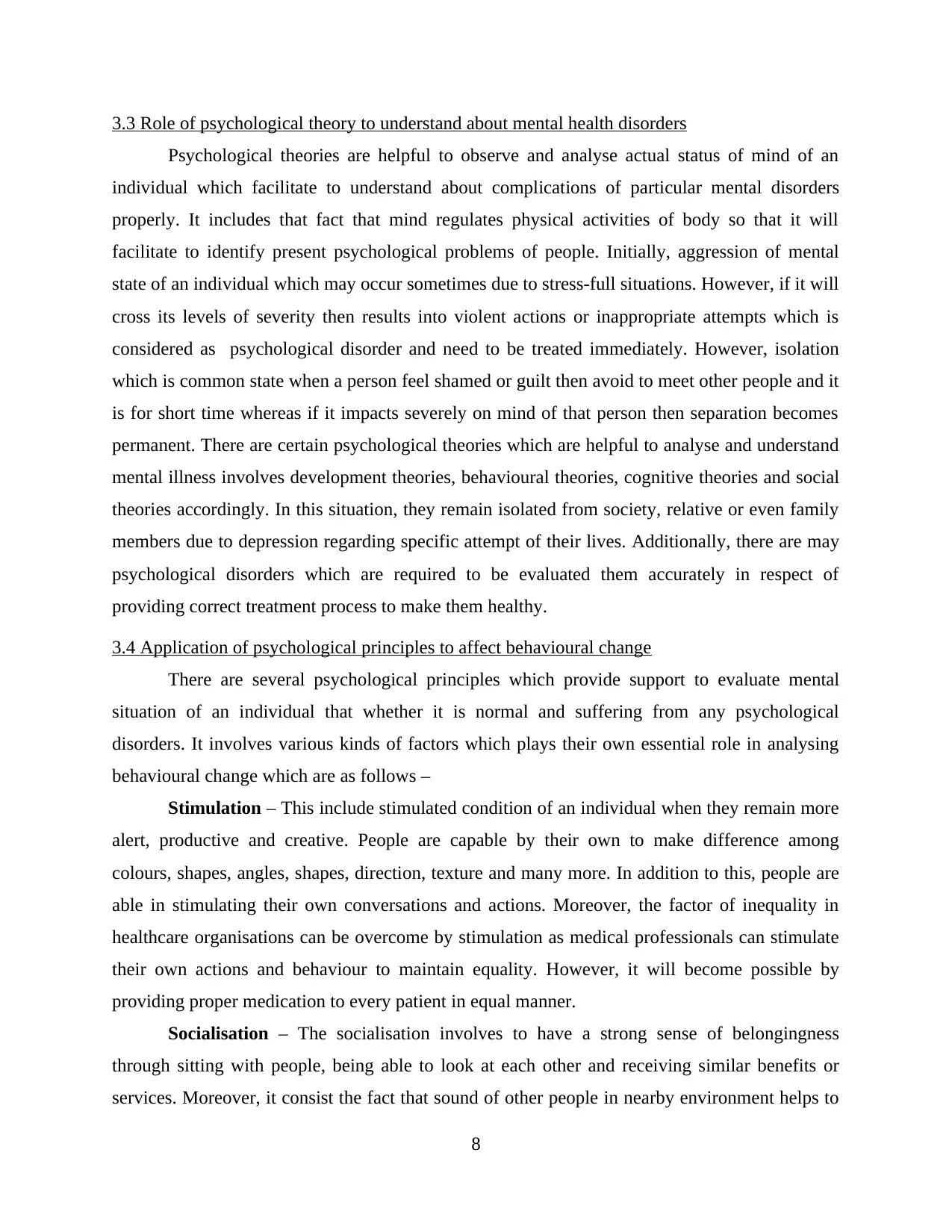
3.3 Role of psychological theory to understand about mental health disorders
Psychological theories are helpful to observe and analyse actual status of mind of an
individual which facilitate to understand about complications of particular mental disorders
properly. It includes that fact that mind regulates physical activities of body so that it will
facilitate to identify present psychological problems of people. Initially, aggression of mental
state of an individual which may occur sometimes due to stress-full situations. However, if it will
cross its levels of severity then results into violent actions or inappropriate attempts which is
considered as psychological disorder and need to be treated immediately. However, isolation
which is common state when a person feel shamed or guilt then avoid to meet other people and it
is for short time whereas if it impacts severely on mind of that person then separation becomes
permanent. There are certain psychological theories which are helpful to analyse and understand
mental illness involves development theories, behavioural theories, cognitive theories and social
theories accordingly. In this situation, they remain isolated from society, relative or even family
members due to depression regarding specific attempt of their lives. Additionally, there are may
psychological disorders which are required to be evaluated them accurately in respect of
providing correct treatment process to make them healthy.
3.4 Application of psychological principles to affect behavioural change
There are several psychological principles which provide support to evaluate mental
situation of an individual that whether it is normal and suffering from any psychological
disorders. It involves various kinds of factors which plays their own essential role in analysing
behavioural change which are as follows –
Stimulation – This include stimulated condition of an individual when they remain more
alert, productive and creative. People are capable by their own to make difference among
colours, shapes, angles, shapes, direction, texture and many more. In addition to this, people are
able in stimulating their own conversations and actions. Moreover, the factor of inequality in
healthcare organisations can be overcome by stimulation as medical professionals can stimulate
their own actions and behaviour to maintain equality. However, it will become possible by
providing proper medication to every patient in equal manner.
Socialisation – The socialisation involves to have a strong sense of belongingness
through sitting with people, being able to look at each other and receiving similar benefits or
services. Moreover, it consist the fact that sound of other people in nearby environment helps to
8
Psychological theories are helpful to observe and analyse actual status of mind of an
individual which facilitate to understand about complications of particular mental disorders
properly. It includes that fact that mind regulates physical activities of body so that it will
facilitate to identify present psychological problems of people. Initially, aggression of mental
state of an individual which may occur sometimes due to stress-full situations. However, if it will
cross its levels of severity then results into violent actions or inappropriate attempts which is
considered as psychological disorder and need to be treated immediately. However, isolation
which is common state when a person feel shamed or guilt then avoid to meet other people and it
is for short time whereas if it impacts severely on mind of that person then separation becomes
permanent. There are certain psychological theories which are helpful to analyse and understand
mental illness involves development theories, behavioural theories, cognitive theories and social
theories accordingly. In this situation, they remain isolated from society, relative or even family
members due to depression regarding specific attempt of their lives. Additionally, there are may
psychological disorders which are required to be evaluated them accurately in respect of
providing correct treatment process to make them healthy.
3.4 Application of psychological principles to affect behavioural change
There are several psychological principles which provide support to evaluate mental
situation of an individual that whether it is normal and suffering from any psychological
disorders. It involves various kinds of factors which plays their own essential role in analysing
behavioural change which are as follows –
Stimulation – This include stimulated condition of an individual when they remain more
alert, productive and creative. People are capable by their own to make difference among
colours, shapes, angles, shapes, direction, texture and many more. In addition to this, people are
able in stimulating their own conversations and actions. Moreover, the factor of inequality in
healthcare organisations can be overcome by stimulation as medical professionals can stimulate
their own actions and behaviour to maintain equality. However, it will become possible by
providing proper medication to every patient in equal manner.
Socialisation – The socialisation involves to have a strong sense of belongingness
through sitting with people, being able to look at each other and receiving similar benefits or
services. Moreover, it consist the fact that sound of other people in nearby environment helps to
8
Paraphrase This Document
Need a fresh take? Get an instant paraphrase of this document with our AI Paraphraser
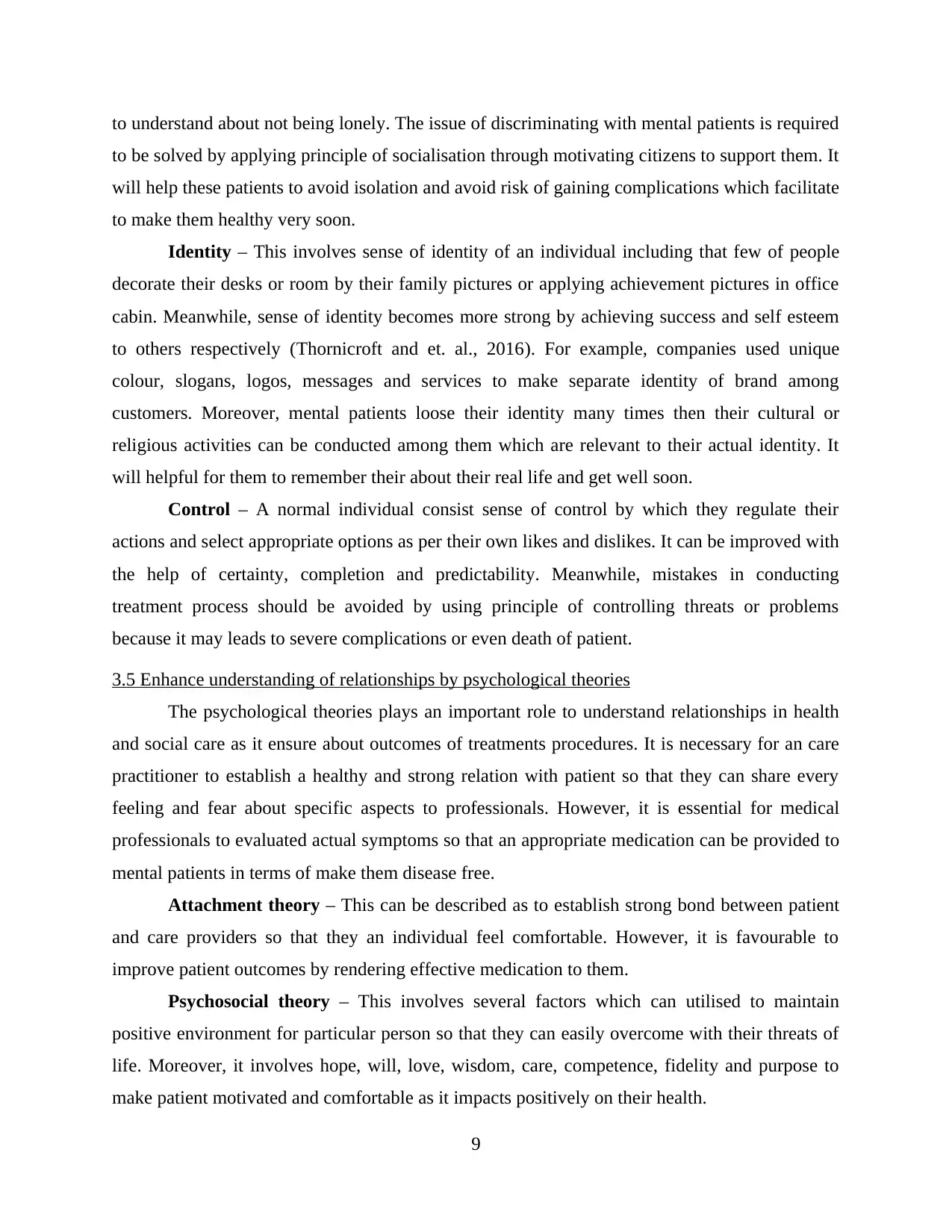
to understand about not being lonely. The issue of discriminating with mental patients is required
to be solved by applying principle of socialisation through motivating citizens to support them. It
will help these patients to avoid isolation and avoid risk of gaining complications which facilitate
to make them healthy very soon.
Identity – This involves sense of identity of an individual including that few of people
decorate their desks or room by their family pictures or applying achievement pictures in office
cabin. Meanwhile, sense of identity becomes more strong by achieving success and self esteem
to others respectively (Thornicroft and et. al., 2016). For example, companies used unique
colour, slogans, logos, messages and services to make separate identity of brand among
customers. Moreover, mental patients loose their identity many times then their cultural or
religious activities can be conducted among them which are relevant to their actual identity. It
will helpful for them to remember their about their real life and get well soon.
Control – A normal individual consist sense of control by which they regulate their
actions and select appropriate options as per their own likes and dislikes. It can be improved with
the help of certainty, completion and predictability. Meanwhile, mistakes in conducting
treatment process should be avoided by using principle of controlling threats or problems
because it may leads to severe complications or even death of patient.
3.5 Enhance understanding of relationships by psychological theories
The psychological theories plays an important role to understand relationships in health
and social care as it ensure about outcomes of treatments procedures. It is necessary for an care
practitioner to establish a healthy and strong relation with patient so that they can share every
feeling and fear about specific aspects to professionals. However, it is essential for medical
professionals to evaluated actual symptoms so that an appropriate medication can be provided to
mental patients in terms of make them disease free.
Attachment theory – This can be described as to establish strong bond between patient
and care providers so that they an individual feel comfortable. However, it is favourable to
improve patient outcomes by rendering effective medication to them.
Psychosocial theory – This involves several factors which can utilised to maintain
positive environment for particular person so that they can easily overcome with their threats of
life. Moreover, it involves hope, will, love, wisdom, care, competence, fidelity and purpose to
make patient motivated and comfortable as it impacts positively on their health.
9
to be solved by applying principle of socialisation through motivating citizens to support them. It
will help these patients to avoid isolation and avoid risk of gaining complications which facilitate
to make them healthy very soon.
Identity – This involves sense of identity of an individual including that few of people
decorate their desks or room by their family pictures or applying achievement pictures in office
cabin. Meanwhile, sense of identity becomes more strong by achieving success and self esteem
to others respectively (Thornicroft and et. al., 2016). For example, companies used unique
colour, slogans, logos, messages and services to make separate identity of brand among
customers. Moreover, mental patients loose their identity many times then their cultural or
religious activities can be conducted among them which are relevant to their actual identity. It
will helpful for them to remember their about their real life and get well soon.
Control – A normal individual consist sense of control by which they regulate their
actions and select appropriate options as per their own likes and dislikes. It can be improved with
the help of certainty, completion and predictability. Meanwhile, mistakes in conducting
treatment process should be avoided by using principle of controlling threats or problems
because it may leads to severe complications or even death of patient.
3.5 Enhance understanding of relationships by psychological theories
The psychological theories plays an important role to understand relationships in health
and social care as it ensure about outcomes of treatments procedures. It is necessary for an care
practitioner to establish a healthy and strong relation with patient so that they can share every
feeling and fear about specific aspects to professionals. However, it is essential for medical
professionals to evaluated actual symptoms so that an appropriate medication can be provided to
mental patients in terms of make them disease free.
Attachment theory – This can be described as to establish strong bond between patient
and care providers so that they an individual feel comfortable. However, it is favourable to
improve patient outcomes by rendering effective medication to them.
Psychosocial theory – This involves several factors which can utilised to maintain
positive environment for particular person so that they can easily overcome with their threats of
life. Moreover, it involves hope, will, love, wisdom, care, competence, fidelity and purpose to
make patient motivated and comfortable as it impacts positively on their health.
9
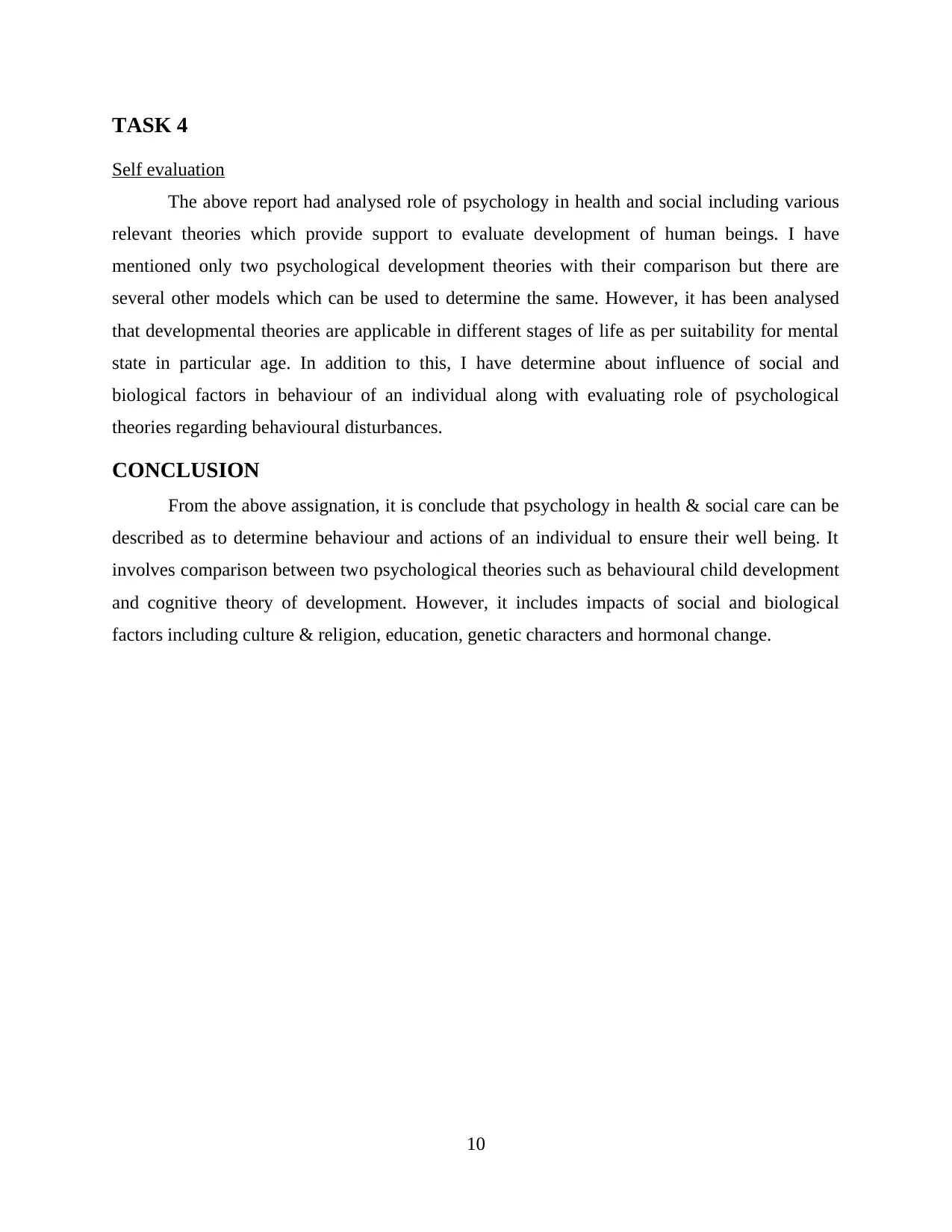
TASK 4
Self evaluation
The above report had analysed role of psychology in health and social including various
relevant theories which provide support to evaluate development of human beings. I have
mentioned only two psychological development theories with their comparison but there are
several other models which can be used to determine the same. However, it has been analysed
that developmental theories are applicable in different stages of life as per suitability for mental
state in particular age. In addition to this, I have determine about influence of social and
biological factors in behaviour of an individual along with evaluating role of psychological
theories regarding behavioural disturbances.
CONCLUSION
From the above assignation, it is conclude that psychology in health & social care can be
described as to determine behaviour and actions of an individual to ensure their well being. It
involves comparison between two psychological theories such as behavioural child development
and cognitive theory of development. However, it includes impacts of social and biological
factors including culture & religion, education, genetic characters and hormonal change.
10
Self evaluation
The above report had analysed role of psychology in health and social including various
relevant theories which provide support to evaluate development of human beings. I have
mentioned only two psychological development theories with their comparison but there are
several other models which can be used to determine the same. However, it has been analysed
that developmental theories are applicable in different stages of life as per suitability for mental
state in particular age. In addition to this, I have determine about influence of social and
biological factors in behaviour of an individual along with evaluating role of psychological
theories regarding behavioural disturbances.
CONCLUSION
From the above assignation, it is conclude that psychology in health & social care can be
described as to determine behaviour and actions of an individual to ensure their well being. It
involves comparison between two psychological theories such as behavioural child development
and cognitive theory of development. However, it includes impacts of social and biological
factors including culture & religion, education, genetic characters and hormonal change.
10
⊘ This is a preview!⊘
Do you want full access?
Subscribe today to unlock all pages.

Trusted by 1+ million students worldwide
1 out of 13
Related Documents
Your All-in-One AI-Powered Toolkit for Academic Success.
+13062052269
info@desklib.com
Available 24*7 on WhatsApp / Email
![[object Object]](/_next/static/media/star-bottom.7253800d.svg)
Unlock your academic potential
Copyright © 2020–2026 A2Z Services. All Rights Reserved. Developed and managed by ZUCOL.





